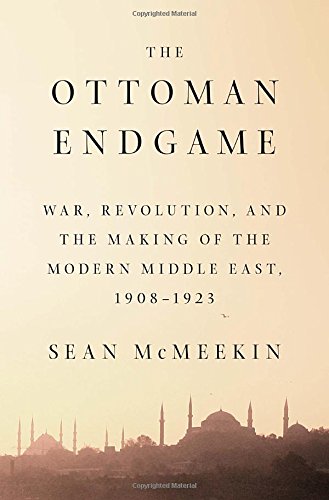
The Ottoman Endgame
War, Revolution, and the Making of the Modern Middle East, 1908-1923
کتاب های مرتبط
- اطلاعات
- نقد و بررسی
- دیدگاه کاربران
نقد و بررسی

Starred review from September 14, 2015
In this magisterial history, McMeekin (July 1914), a prolific military historian at Bard College, recounts the epochal social, political, and demographic transformations unfolding across the Middle East in the run-up to and aftermath of WWI. Giving events in the Ottoman theater the same attention to detail usually reserved for the Western front, McMeekin argues that principals on all sides were stymied by myopic preconceptions as the war gained steam, with movements on the ground easily overcoming any pretense of rational planning. For example, of the disastrous Dardanelles Campaign, he writes, “Churchill’s notion that enemy morale was about to crack... flies so powerfully in the face of logic that it is remarkable historians have ever given it credence.” Meanwhile, Russian czars’ centuries-old coveting of Constantinople, a powerful driver of the conflict, was nullified in an instant by a revolutionary Russia that abjured adventurism abroad: “Of all the deathbed miracles that had saved the Ottoman Empire in the modern era, Lenin’s revolution was surely the greatest.” McMeekin’s gripping narrative style and literary panache make this work an attractive resource for anyone looking to further understand the destruction and dislocation in Asia Minor that ushered in the modern age.

August 15, 2015
Thought-provoking historical study of the closing years of the Ottoman Empire and the concurrent rise of the modern Middle East. McMeekin (History/Bard Coll.; July 1914: Countdown to War, 2013, etc.) observes early on that there's much more to that story than the smoothly duplicitous diplomacy that makes up the last hour of Lawrence of Arabia and much more than T.E. Lawrence himself. Certainly there is more than the Armenian genocide, horrible though it was. If there's news in this scholarly treatise, it might be found in the author's explanation for how that still-controversial event unfolded, an explanation likely to satisfy neither side precisely because it's evenhanded. Without offering an apology or rationalization, McMeekin describes the exhaustion the Turks felt on fighting a multifront world war, "coming as it did after three years of war against Italy and the Balkan League" and so exhausting Ottoman resources that the military leader who would become Kemal Ataturk instituted the draft for non-Muslims and allowed men up to 55 to enlist. Thriving on untold stories, McMeekin looks at the punctuated collapse of the Ottoman Empire in Eastern Europe and its momentary successes following the Bolshevik Revolution in Russia, which had the effect of exposing rivalries between the Ottomans and their German allies that almost resulted in war on yet another front. The author also gives a lucid account of the geneses of secular governments in what became Turkey and those of more theocratically or autocratically inclined ones in the neighboring former provinces. A particularly surprising note is the lobbying on the parts of numerous powers, not least the Turks, for postwar U.S. mandates over the Middle East-thwarted only by the fact that "the Americans themselves wanted no part of them." Though the book is mostly of specialist interest, it is vigorous and accessible and helps explain some of what's going on in today's headlines.
COPYRIGHT(2015) Kirkus Reviews, ALL RIGHTS RESERVED.

September 15, 2015
Renowned author McMeekin (History's Greatest Heist) explains the fall of the Ottoman Empire and the rise of the modern Middle East. Using previously unknown sources from Ottoman and Russian archives, the author denounces the notion that the Middle East as we know it today is a legacy of World War I and Anglo-French decisions in the Sykes-Picot Agreement of 1916. He argues that events far richer and more intricate caused the end of the empire, which for six centuries had provided its subjects with a common identity, protected non-Muslim communities, and balanced tensions between democratic ideas and religious fundamentalism. Wars by European powers large and small, internal forces, and Turkish nationalists wishing to abandon the failing empire in favor of a strong nation-state all contributed to the geopolitics of the present day. VERDICT While this valuable academic work is recommended for those who love complex military and political strategy, it's not accessible to a general audience unversed in early 20th-century world history.--Heidi Uphoff, Sandia National Laboratories, NM
Copyright 2015 Library Journal, LLC Used with permission.

























دیدگاه کاربران